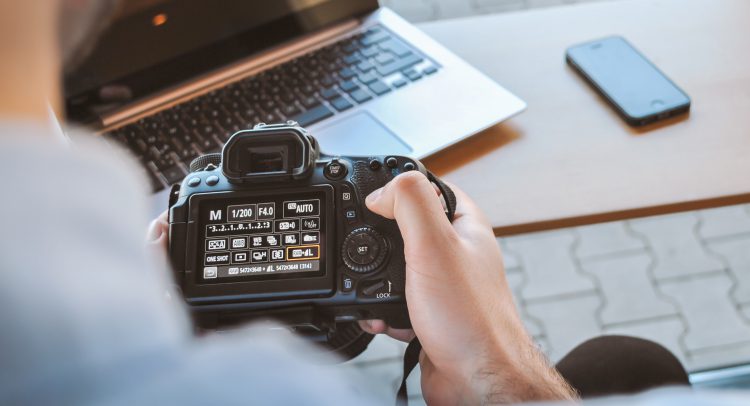HOW PHOTOGRAPHERS ARE ADAPTING TO HEALTH RESTRICTIONS AND LOCKDOWNS.
By Jonnica Hill
When Kendra Bartels downsized and rescheduled her dream fall wedding to a smaller, summer wedding, she didn’t have high expectations. The new plan meant inviting only 26 people instead of 150, wearing a different wedding dress and accepting that nothing would be as planned, including the photography.
Despite the restrictions, being outside made social distancing easier and led to a candid approach from the photographer and videographer. When Bartels received her photos and video, they exceeded her expectations, perfectly capturing her day and helping her forget the wedding happened during a global pandemic.
“It made me realize that, with everything going on in the world, we were almost in our own little world that day. You wouldn’t have guessed that the world was kind of crumbling around us,” she says.
The COVID-19 pandemic is an unexpected experience for everyone, including photographers. During Ontario’s first lockdown in March 2020, most photographers shut down because they weren’t considered an essential service.
According to a 2019 Statistics Canada survey, there are over 9,000 established photography businesses in Canada, generating an average of $124,000 per year. Ontario photographers were able to resume work during the second phase of re-opening in June, but for most, work looks different now.
Toronto-based Becca Hamel has been shooting live music for over a year and had just committed to touring full time before the lockdown. After the tours she had planned for the spring and summer were cancelled, Hamel expanded her skills beyond photographing concerts.
In May, she spent two weeks quarantining with friends and clients, Toronto band Valley, in Grimsby, Ont., while they recorded new music. Hamel helped shoot album artwork and music videos and is also learning more about graphic design and videography.
“I’d been focusing on doing live music for so long and really trying to perfect my skills in that area,” she says. “So, it was actually really great because it made me realize that there are so many other parts of the music industry.”
Tania Haldar, a corporate photographer based in Oakville, Ont., also adjusted her business following the lockdown. In 2019, Haldar photographed over 50 corporate events, but this year all her events were cancelled, which cut her revenue by 30 per cent.
While originally focused on corporate events and headshots in her home studio, Haldar now offers one portrait session per day at her new office, outside her home, which has increased her client list by at least 60 per cent.
“I just feel more comfortable when there is only one person and, when the person leaves, I have the entire 24 hours after that to air out the space, sanitize it and make it all ready for the next day.”
In June, the Canadian Association of Professional Image Creators issued health and safety guidelines for photographers during the pandemic.
The guidelines say photographers “must ensure that they are abiding by all local health and safety directions [and] … must establish their own policies that clearly outline the measures they are implementing to mitigate the spread of COVID-19.”
Marcus Armstrong, a Toronto-based director and video editor, says the biggest challenge of the health restrictions and personal protective equipment is reduced personal connection.
“It’s just such a different feeling than how it used to be because usually interviews, it’s like a conversation and you read the person’s facial expressions and they’re smiling, you’re smiling, and you kind of have that connection,” he says. “Now you have this mask on and they can’t see your face. They get to know you, but it’s not the same.”
Hana El Zohiry, a photographer in Mississauga, Ont., and recent graduate from Guelph-Humber’s media studies program, primarily shoots outdoors and from a distance and wasn’t as affected by COVID-19 protocols.
“It was a little bit more of a communicative change in the sense of, ‘are you OK with me touching your things? Are you OK with me moving your stuff out of the way?’ and being in touch with that conversation at the beginning of the session rather than just in the middle of it,” she says.
While the pandemic challenged photographers to change their focus and experiment with new tools, they found opportunities to expand their skills, develop their businesses and take some time to relax.
During the lockdown, Oakville photographer Karen Mak focused on photographing products sent to her by mail from clients. In her extra time, she took online courses, rebranded her business and networked with other small businesses.
“My mantra for my business is to support local and to support others,” she says. “Building relationships, not just from a personal level but a business relationship level, so that if I were suffering, I hope they would support me.”
After the first lockdown, photographers aren’t excited about a second one but feel more prepared knowing what it’s like. Armstrong and El Zohiry, who’ve been in a second lockdown since November, look forward to the extra time to relax and further develop their skills.
“I’m always trying to learn new things, like just trying to not stay stagnant,” says Armstrong. “So, this is a time of reflection and just learning new things.”

